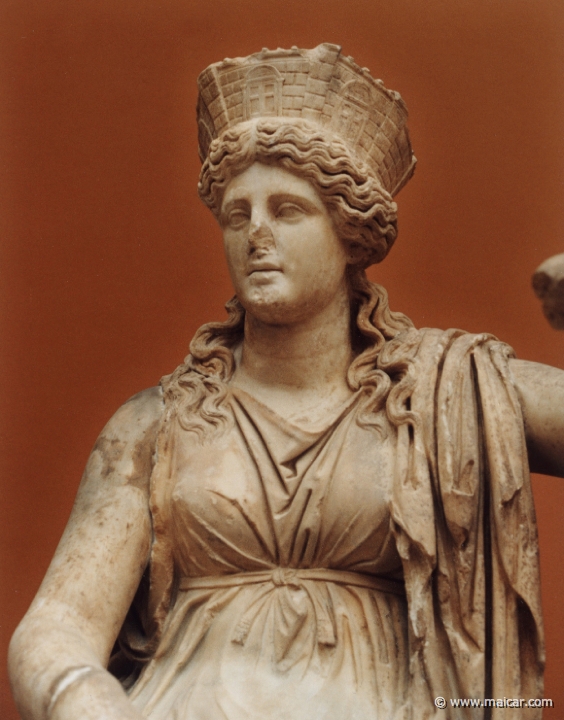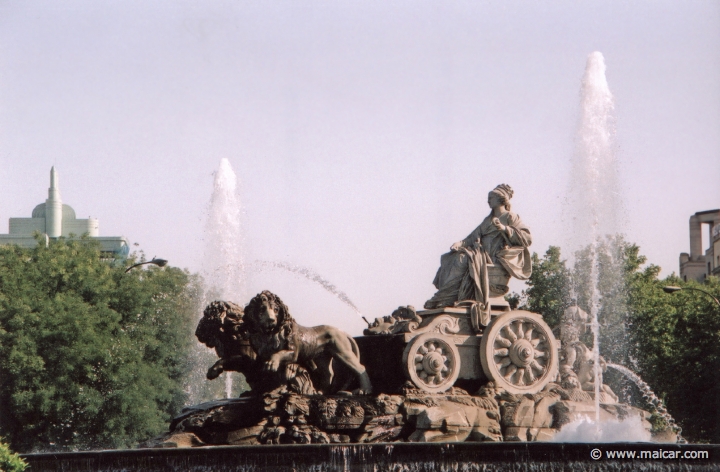|

|
Cybele, identified with Rhea 1. 1617: Roman statue from ca. 100 AD. Ny Carlsberg Glyptotek, Copenhagen.
|
|
|
"Blessed is he who, being fortunate and knowing the rites of the gods, keeps his life pure and has his soul initiated into the Bacchic revels, dancing in inspired frenzy over the mountains with holy purifications, and who, revering the mysteries of great mother Cybele, brandishing the thyrsos, garlanded with ivy, serves Dionysus." (The MAENADS. Euripides, Bacchanals 75).
"I pray thee, clear-voiced Muse, daughter of mighty Zeus, sing of the mother of all gods and men. She is well-pleased with the sound of rattles and of timbrels, with the voice of flutes and the outcry of wolves and bright-eyed lions, with echoing hills and wooded coombes." (Homeric Hymn 14, To The Mother of the Gods).
|
|
Rich-haired Rhea 1, also called Opis 5, or Cybele (after Mount Cybele in Phrygia), or Cybebe, or
Dindymene (after Mount Dindymus in Phrygia), or Agdistis,
or "The Mountain Mother", or "The Mother of the
Gods", or "The Great Goddess", was highly
worshipped in Phrygia with orgies, and is mostly remembered for having
protected Zeus by wrapping
a stone in clothes and given it to Cronos to swallow, as if
it were the newborn child that he wished to
destroy.
Uranus' hate against
his children
Rhea 1 became queen of the universe when her brother and husband Cronos castrated and
dethroned their father and ruler Uranus. The cause of that
revolt and Castration of
Uranus is to be found in Uranus' wicked nature;
for he, acting as an stern tyrant and hating his
own offspring, hid some or many of his children
(the CYCLOPES and the HECATONCHEIRES)
away in a secret place on earth, or as some say,
cast them into Tartarus, which is a gloomy place in
the Underworld as far
from Earth as Earth is from Heaven. But Uranus' wife Gaia grieved at the
destruction of her children, and being strained and
stretched with so many gigantic beings inside her,
planned the destruction of her own husband and his
rule as a way to set them and herself free.
Cronos' ambush
In order to overthrow him, Gaia persuaded the TITANS, who were also her
own children by Uranus,
to attack their father; and when Cronos received from his
mother an adamantine sickle with jagged teeth, he
found the courage in his heart to come out from a
hiding place as Uranus by
night approached Gaia longing for love, and cut off his father's
genitals, throwing them into the sea behind his
back.
Like his own father
This is how Cronos became the ruler of the universe. But having come
into power, he soon forgot the purpose of his
revolt, and shut his brethren up in the same dark
depth where they had been before. And what worse
was: Cronos was
prophetically informed by his parents that he would
be dethroned by his own son. This is why he started
to swallow his offspring at birth: his firstborn Hestia he swallowed, then Demeter and Hera, and after them Hades and Poseidon.
Rhea 1's stone
When this procedure had become routine, Rhea 1, tired of being so often pregnant yet never a mother, decided to deceive her husband by wrapping a stone in clothes and giving it to him to swallow, as if it were the newborn child Zeus. Some say that when Rhea 1 brought the stone to Cronos, he, believing the stone to be a child, bade her offer milk to the baby. Rhea 1 then pressed her breast, and the flowing milk created the stars that are known by the name of the Milky Way.
Gives birth to Zeus
Having thus deluded her husband, Rhea 1 went to Crete where she gave birth
to Zeus in a cave in Mount Dicte or in Mount Ida. And while the child was fed by the NYMPHS Adrastia 1 and Ide 3, the daughters of Melisseus 1, on the milk of Amalthea the goat, the CURETES who guarded the cave clashed their spears on their shields in order that Cronos might not hear the child's voice.
Arcadian tales
The Arcadians affirm that when Rhea 1 gave birth, before Zeus, to Poseidon, she declared
to Cronos that she had
given birth to a horse. Apparently Cronos had no reason to disbelieve his wife, for gods are capable of anything, and so Rhea 1, who had laid Poseidon in a flock of lambs to live with them, gave him a foal to swallow instead of the child. This account has been considered to be both foolish and wise, for wisdom at times appears as foolishness, being sometimes difficult to tell one from the other, specially when riddles and hidden meanings are suspected. And the Arcadians also asserted that in a wonderful mountain near Methydrium, Rhea 1 enlisted, when she was pregnant with Zeus, the giant Hopladamus
as an ally against Cronos, whom she feared
might attack her, adding that it was in that place
that the substitution of a stone for the child took
place. The stone itself, however, was shown at Delphi, and olive oil was
poured on it every day, and on special occasions
unworked wool was placed on it. And some believed
that Zeus was born in Arcadia; for otherwise they had not said that Rhea 1 caused a stream to break forth between Triphylia and Messenia in order to
have water to bathe in after giving birth to Zeus.
Another tale
In any case, the stone concealed by Rhea 1 in a garment went down the throat of her husband, who believed to swallow a child. Some say that Rhea 1 gave the child to Hera, who
took it to Crete; for they
think that neither Hera nor Hades nor Poseidon had been
swallowed by Cronos, who
instead had cast Hades to
Tartarus, and Poseidon under the sea. They add that when Cronos realised that he
had not swallowed Zeus but
a stone, he started to hunt the child, whom Hera had taken to Crete, to be nursed by
Amalthea, and protected by the noise created by the
CURETES or the CORYBANTES.
The Mother of the Gods
It is on account of this noise that Rhea 1, the Mother of the Gods, became the patroness of cymbals, and the lions yoked to her chariot, they say, are those which then roamed in Crete. For the cymbal or tambourine, as well as the castanets, have ever since been used to perform the rites of Rhea 1 or Cybele, the Mother of the Gods. This rites, it has been noticed, have a resemblance with those exhibited in the worship of Dionysus 2, the reason
being that this god, having been driven mad by Hera, came to Phrygia and was there purified by Rhea 1, learning from her the rites of initiation, as also did Oenone 1, Paris' first wife. And
there has been no little speculation about these
customs, whether they originated in Phrygia or in Crete; for these two have
many names in common, like Ida and Dicte. And the
same could be said of the DACTYLS, who learned their skill to work iron from Rhea 1; for though they were the attendants of the goddess in Phrygia, they are also
related to Crete.
Demeter and Leto
It was Rhea 1, they say, who persuaded Demeter to moderate her
grief and her wrath for the loss of Persephone, accepting
to share her daughter with the Lord of the Underworld:
"Come, my
daughter; for far-seeing Zeus the loud-thunderer calls you to
join the families of the gods, and has promised to
give you what rights you please among the deathless
gods, and has agreed that for a third part of the
circling year your daughter shall go down to
darkness and gloom, but for the two parts shall be
with you and the other deathless gods: so has he
declared it shall be and has bowed his head in
token. But come, my child, obey, and be not too
angry unrelentingly with the dark-clouded Son of Cronos; but rather increase forthwith for
men the fruit that gives them life." (Rhea 1 to Demeter. Homeric
Hymn to Demeter 460).
And she has also been counted among the
goddesses who attended Leto when she was about to give birth to Apollo in Delos.
|

|
9936: Rhea/Cibeles. Plaza Cibeles. Madrid.
|
|
|
|